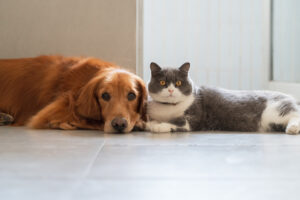
Immunizations for dogs and cats are absolutely critical to keep up on because they ensure the health and safety of your companion.
As a pet owner, ensuring the health and well-being of your beloved companions is one of the many tasks you have taken on. One crucial aspect of pet care is immunization, which plays a pivotal role in protecting dogs and cats from a myriad of potentially deadly diseases. Immunizations for dogs and cats aren’t the most enjoyable aspect of pet companionship, but they are of critical importance to ensure the health and safety of our furry companions.
Common Immunizations for Dogs
- Rabies Vaccine: Rabies is a fatal viral disease that affects the central nervous system of mammals, including humans. It is typically transmitted through the bite of an infected animal, such as raccoons, bats, and skunks. Vaccination against rabies is not only crucial for the health of dogs but also required by law in many jurisdictions to prevent the spread of this deadly disease.
- Distemper Vaccine: Canine distemper is a highly contagious viral illness that affects the respiratory, gastrointestinal, and nervous systems of dogs. It is spread through airborne exposure to respiratory secretions or contact with contaminated surfaces. Vaccination is essential for protecting dogs from this serious and often fatal disease.
- Parvovirus Vaccine: Canine parvovirus is a highly contagious viral infection that primarily affects puppies and unvaccinated dogs. It attacks the gastrointestinal tract, leading to severe vomiting, diarrhea, dehydration, and, in some cases, death. Vaccination is critical for preventing the spread of parvovirus and protecting dogs from this devastating illness.
- Canine Adenovirus Vaccine: Canine adenovirus type 2 (CAV-2) is one of the pathogens responsible for kennel cough, a contagious respiratory infection that spreads rapidly in places where dogs congregate. Vaccination against CAV-2 helps reduce the risk of kennel cough and its associated complications.
Common Immunizations for Cats
- Rabies Vaccine: Similar to dogs, cats are susceptible to rabies and can transmit the virus to humans through bites or scratches. Vaccination against rabies is essential for protecting both cats and humans from this deadly disease.
- Feline Herpesvirus and Calicivirus Vaccine: These viruses are major causes of feline upper respiratory infections, commonly known as cat flu. Symptoms include sneezing, nasal discharge, fever, and loss of appetite. Vaccination helps reduce the severity and duration of illness if a cat becomes infected.
- Feline Panleukopenia Vaccine: Also known as feline distemper, panleukopenia is a highly contagious viral disease that affects cats of all ages, with kittens being particularly vulnerable. It attacks the gastrointestinal tract, bone marrow, and immune system, leading to severe illness and often death. Vaccination is crucial for preventing panleukopenia and protecting cats from this deadly virus.
- Feline Leukemia Vaccine: Feline leukemia virus (FeLV) is a contagious retrovirus that can suppress the immune system and cause various health problems, including anemia, lymphoma, and immunodeficiency. Vaccination is recommended for cats at risk of exposure to FeLV, such as those that spend time outdoors or live in multi-cat households.
Importance of Immunizations
Immunizations are vital for maintaining the health and safety of dogs and cats for several reasons:
- Disease Prevention: Vaccinations protect pets from potentially life-threatening diseases that can spread rapidly within the pet population. Immunizations help pets live longer, healthier lives by preventing illness.
- Herd Immunity: Vaccinating pets helps create herd immunity, reducing the prevalence of diseases in the community and lowering the risk of outbreaks. This not only protects vaccinated pets but also unvaccinated individuals, including those who are too young, too old, or unable to be vaccinated due to medical reasons.
- Public Health: Some diseases, such as rabies, can be transmitted from animals to humans. Vaccinating pets against rabies helps prevent the spread of the virus to humans, safeguarding public health.
- Socialization: Dogs and cats that socialize with other pets at places like dog parks and doggy daycare are at a higher risk of exposure to infectious diseases. Immunizations provide essential protection against these diseases, reducing the likelihood of infection during social interactions.
- Cost Savings: The cost of treating a sick pet can be substantial, both financially and emotionally. Immunizations are a cost-effective preventive measure compared to the expense of treating preventable diseases.
Trust Maryland Veterinary Surgical Services With Your Companion’s Health
Your companion’s health is important, and the team at MVSS is ready to provide the best care possible for your furry family. We are dedicated to combining comprehensive exams and assessments with informative and honest discussions of your companion’s care. Once we have worked with you to decide on the best course of action for your dog, our professionals will use their surgical expertise to work towards the goal of giving your companion an active and pain-free life. We are proud to serve loyal companions in Catonsville and Baltimore. To learn more about our services, give us a call at 410-788-4088 or visit us online. For more information and tips for dog health, follow us on Facebook and Pinterest.
